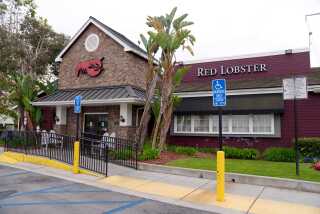Downey leaders ousted
- Share via
Reeling from a growing pile of delinquent mortgages, Downey Financial Corp. on Thursday reshuffled its top management and signaled that it would seek to sell the company. But analysts said it would have trouble finding a buyer.
Highlighting the gravity of Downey’s circumstances, Maurice L. McAlister, the company’s chairman and co-founder, gave up his position after running the thrift company for a half-century. Also leaving the Newport Beach-based operator of Downey Savings & Loan was Chief Executive Daniel D. Rosenthal, McAlister’s former son-in-law.
The management changes, which people familiar with the situation said were initiated by Downey’s board, indicate a desperation to raise new capital or sell the company, analysts said.
“I do think they are going to try to sell this thing, but I don’t think they can sell it because of the lack of insight anyone has into how deep and severe this housing market is going to be, especially in the geographic locations Downey is in,” said Paul Miller, an analyst with FBR Capital Markets.
Downey’s more than 170 branches are concentrated in Los Angeles, Orange, Riverside and San Bernardino counties -- areas that, like much of California, have been hard hit by falling home prices.
Long known as a conservative lender, Downey veered off its course in recent years by making many “option ARM” loans, which are risky adjustable-rate mortgages that allow borrowers to initially pay less than the interest that accrued each month. With home prices sinking, such loans are seeing high default rates.
On Thursday, the company said it held $1.9 billion in bad loans on June 30, or 15.5% of its total assets, about double the figure six months earlier.
The company also reported a second-quarter loss of $218.9 million, or $7.86 a share, its fourth straight quarterly deficit. Analysts had predicted a loss of about $130 million. The company posted a profit of $32.7 million in last year’s second quarter.
Downey also said it was exploring “strategic alternatives,” a term typically used by a company seeking to sell all or part of itself.
The news Thursday sent Downey’s stock plunging 93 cents, or 34%, to $1.83. The decline suggests that the stock market doubts the company can find a buyer at a decent price. The shares are down 94% this year.
Downey initially declined to comment on the management changes but late in the day supplied a statement saying they were “designed to keep the bank on firm and solid footing.”
The company wouldn’t make any executives available for interviews.
McAlister, 83, who owns a 20% stake in Downey, had retained tight control through good times and bad, but in recent years the ranks of executives under him changed frequently. On Thursday, the company named its chief operating officer, Tom Prince, to be interim chief executive -- making him the company’s fourth CEO in four years.
This isn’t the first time Downey has considered a sale. In 1993, the company hired an investment bank to assess its options for the future, and its stock soared on takeover speculation. But the sale never happened, and shareholders punished the stock.
Joe Garrett, a banking advisor with Garrett, Watts & Co. in Berkeley, said McAlister always wanted to keep the company independent.
“He’s been the only reason they haven’t been sold,” Garrett said. “It’s human nature. I’ve seen it in a lot of boardrooms: ‘This has been my baby, my family, something I’ve nurtured for 50 years.’ ”
Downey has a strong customer base that might be attractive to other banks, analysts said, although its deposits have been shrinking this year. It also owns most of its bank buildings, some shopping malls and other real estate.
By contrast, recently failed IndyMac Bank in Pasadena, which the government is trying to sell, has very little in the way of hard assets and a much bigger volume of troubled loans.
Some healthy banks such as Wells Fargo & Co. might want to kick Downey’s tires, Miller of FBR Capital Markets said.
But now is certainly not a good time to be selling a bank, said Jason Arnold, a consultant with RBC Capital Markets in San Francisco.
“I’m not particularly optimistic there will be a big frenzy of buying right now,” he said, “for them or anyone else.”
--
More to Read
Inside the business of entertainment
The Wide Shot brings you news, analysis and insights on everything from streaming wars to production — and what it all means for the future.
You may occasionally receive promotional content from the Los Angeles Times.










